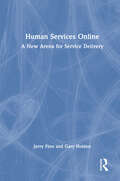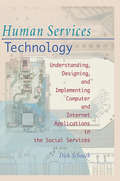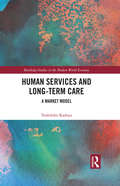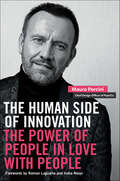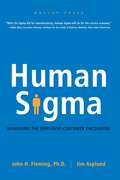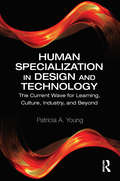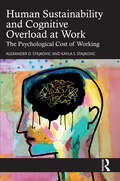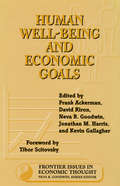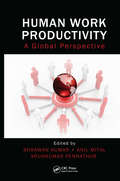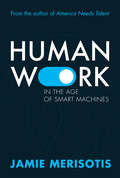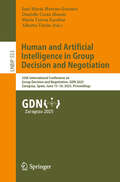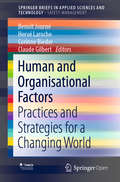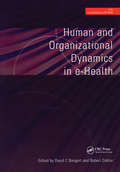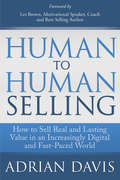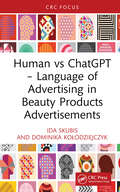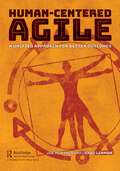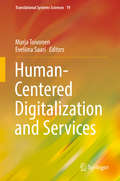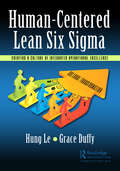- Table View
- List View
Human Security and Natural Disasters (Routledge Humanitarian Studies)
by Christopher Hobson, Paul Bacon and Robin Cameron"Human security" is an approach that rejects the traditional prioritization of state security, and instead identifies the individual as the primary referent of security. It offers a way of broadening our perspective, and recognizing that the most pressing threats to individuals do not come from interstate war, but from the emergencies that affect people every day, such as famine, disease, displacement, civil conflict and environmental degradation. Human security is about people living their lives with dignity, being free from "fear" and "want". To date, there has been a strong tendency to focus on insecurity caused by civil conflict, with less attention on issues to do with environmental security. This volume addresses the threat posed by natural disasters, which represent an increasingly major human security threat to people everywhere. In looking at natural disasters, this book also refines the human security approach. It does so through developing its previously unexplored interdisciplinary potential. This volume explicitly seeks to bring the human security approach into conversation with contributions from a range of disciplines: development, disaster sociology, gender studies, international law, international relations, philosophy, and public health. Collectively these scholars unpack the "human" element of "natural" disasters. In doing so, an emphasis is placed on how pre-existing vulnerabilities can be gravely worsened, as well as the interconnected nature of human security threats. The book presents a variety of case studies that include the Indian Ocean tsunami, Hurricane Katrina, the 2010 Haiti earthquake, and the 2011 "triple disasters" in Japan.
Human Security and Non-Citizens: Law, Policy and International Affairs
by Alice Edwards Carla FerstmanThe past decades have seen enormous changes in our perceptions of 'security', the causes of insecurity and the measures adopted to address them. Threats of terrorism and the impacts of globalisation and mass migration have shaped our identities, politics and world views. This volume of essays analyses these shifts in thinking and, in particular, critically engages with the concept of 'human security' from legal, international relations and human rights perspectives. Contributors consider the special circumstances of non-citizens, such as refugees, migrants, and displaced and stateless persons, and assess whether, conceptually and practically, 'human security' helps to address the multiple challenges they face.
Human Services Online: A New Arena for Service Delivery
by Gary Holden Jerry FinnWill your agency or students have the training to use the Internet in practice?Human Services Online: A New Arena for Service Delivery focuses on ways that Human Services are using the Internet for service delivery, community education, collaboration, advocacy, social change, and resource development. This valuable book highlights the array of innovative services now being offered on the Internet and provides guidelines and cautions for human service professionals in using the Internet to enhance their services.Human Services Online: A New Arena for Service Delivery provides much-needed research and empirical evaluation related to human service online activities and points to areas where future research efforts should be directed. The book describes and evaluates cutting-edge Internet-based services, ethical and legal threats to agencies and consumers that may result from online activities, and theoretical discussions of issues that impact human services as consumers and human service agencies increasingly come online.Topics addressed in Human Services Online: A New Arena for Service Delivery include: online therapy/counseling online fundraising online recruitment of volunteers and virtual volunteer programs online consultation, continuing education, and training ethical, legal, and liability issues related to Web sites and online support online support groups and self-help online advocacy and activism promoting access for under-represented populations use of the Internet to impact specific social problems such as domestic violence or HIV/AIDS Human Services Online: A New Arena for Service Delivery provides guidelines and specific suggestions for agencies considering developing online services. The book examines model programs and their effectiveness so that other agencies can replicate them in their own areas, describes cutting-edge online services that today's human services students will need to be aware of as they enter the job market, and provides information for agencies that will enhance their ability to solicit volunteers and contributions on the Internet.
Human Services Technology: Understanding, Designing, and Implementing Computer and Internet Applications in the Social Services (Haworth Social Ser.)
by Simon Slavin Richard SchoechFeaturing new and updated information on computer technologies, including networking and using the Internet as a necessary tool for professionals, Human Services Technology: Understanding, Designing, and Implementing Computer and Internet Applications in the Social Services will help individual human service professionals and agencies understand, design, implement, and manage computer and Internet applications. Combining several relevant fields, this informative guide provides you with the knowledge to effectively collect, store, manipulate, and communicate information to better serve clients and successfully manage human service agencies. Human Services Technology explains basic technological terms and gives you the history of technology uses before you explore other areas of Information Technology (IT). This essential guide will also improve your ability to find and understand recent research and information on important topics. Human Services Technology will expand your technical know-how and help you better serve clients by offering you proven methods and explanations, such as: describing terms--such as hardware, networking, and telecommunications--with easy-to-understand analogies and examples using IT applications to support social policies, improve service coordination among agencies, efficiently manage agencies in order to save time, support workers’decision making with information, and assist clients solving the problems that internal and external issues cause when determining IT needs, such as working with federal reporting requirements understanding and dealing with the 10 most critical IT issues for managementContaining dozens of graphs, tables, and figures, this knowledgeable book will help you with any IT problem you encounter. Symbols by certain subjects in the book indicate that you can find more information and references on that issue through links on the book?s accompanying Web site. Human Services Technology will enable you to thoroughly understand and use IT to help you offer improved services to clients and manage agencies with increased efficiency and effectiveness.
Human Services and Long-term Care: A Market Model (Routledge Studies in the Modern World Economy)
by Yoshihiko KadoyaProviding human service through markets is inherently problematic. Quality care is critical and unsatisfactory human service greatly influences people’s quality of life. Yet, profit for human service providers is essential for sustainable service provision. This book focuses on striking a balance between human services’ need for quality assurance and market providers’ need for profit.
Human Settlements: Urbanization, Smart Sector Development, and Future Outlook (Advances in 21st Century Human Settlements)
by Giuseppe T. CirellaThe answers to the questions of why and how people live where they live as well as how they maintain and integrate with one another are fundamental human settlement issues rooted in history and culture. Human settlements are historically linked to resource availability, fortification, and the mythos of civilizations. Cities play a central role in redefining the interface between human beings and nature. They have revolutionized the human experience by taming natural surroundings and building environments that are human-centric—often narrowing human life outside the experience of wilderness or the untamed. This book is divided into three parts, it examines urban development trends, explores perspectives in energy efficiency and agriculture security, and considers policy development and future scenarios in human-nature relations. It is a compendium of multidisciplinary work that challenges the directions of modernity and offers reference to alternatives. Authors come from a diverse background and international context to address common overarching theories facing current geography-specific problems. An interconnected overtone of the book attempts to link accelerated urbanization and settlement location to how societies are maintained and integrated. Human settlements are shaped by human ecology and the relationship between humans and their interaction with their environment. Two sectors central to human survival are specifically explored: energy and agriculture. Cutting-edge, smart development looks at the latest findings that reflect the on-going debate facing these sectors. A human settlement metric is envisioned in terms of the past, present, and future. This book is a unique attempt to combine a rethinking about human settlements for scientists, policy-makers, public officials, and people committed to improving urban life, society-wide. Possible agents to resolving human settlement problems include international cooperation and various mechanisms that interlace the international community. Methodological and applied aspects of sustainable management focus on topics such as adaptive knowledge sharing, renewable energy, climate change, agricultural planning, and policy development. An emphasis on scientific and technological advancement, from a bottom-up mapping of society, elucidates a better understanding of the role of knowledgeable societies in which need is considered alongside how such need can be sustained—advancing towards a more promising future.
Human Side of Innovation: The Power of People in Love with People
by Mauro PorciniPepsiCo's award-winning chief design officer reveals the secret to creating life-changing innovations: putting human needs at the center of any design process. Innovation is an act of love-or at least it should be. Always. It is a gesture of empathy, respect, generosity, of one human being's devotion to another, writes Mauro Porcini at the beginning of this extraordinary book. It is in part a memoir by one of the world's leading designers-the first chief design officer at both 3M and Pepsi. But even more, it is a manifesto for a genuine, authentic, and deeply humanistic approach to design, one that aims to create personal and social value first and financial and economic value afterward. In every industry, new technologies have lowered the barrier to entry like never before. Either you design exceptional products or somebody will beat you to it. Porcini shows, through example after example and story after story, that the key to real, world-changing innovation is to put people first-not only the people we innovate for but also the people who lead the innovation process. Putting people first requires what Porcini calls unicorns: people who are in love with people, who have a genuine fire in them to create meaningful solutions for actual human beings. In this book, he describes them, celebrates them, and details their superpowers so you can find them, hire them, grow them, and retain them. Some are qualities you might expect-the ability to dream combined with the ability to execute. But when was the last time you heard an executive ask prospective hires if they were kind, optimistic, curious, or humble? Porcini uses his journey across startups and multinational corporations, through successes and failures, to create a handbook for modern innovators.
Human Sigma: Managing the Employee-Customer Encounter
by John H. Fleming Jim AsplundSix Sigma changed the face of manufacturing quality. Now, HumanSigma is poised to do the same for sales and services. Human Sigma offers an innovative research-based approach to one of the toughest challenges facing sales and services companies today: how to effectively manage the employee-customer encounter to drive business success.What would your company look like if you could increase the revenue and profitability potential of every customer by more than 20 percent? What if you could double the productivity of every employee? And what if these two phenomena together could drive overall organizational performance exponentially? What would your company look like? And how would you go about creating this kind of change? One thing is certain: Business leaders are never going to inspire higher levels of employee productivity and build more passionate customer relationships by doing the same things they have tried for the past 25 years. Business leaders need something fresh. Something new. The last thing they need is more of the same old conventional wisdom about “satisfying” their employees and their customers. Based on solid research by The Gallup Organization, Human Sigma will appeal to senior leaders and line managers alike who are looking for a way to dramatically increase productivity, retain a base of high value customers, and improve overall business performance. Human Sigma is: • Rigorous: Based on research involving hundreds of companies, and over 10 million employees and 10 million customers around the world. • Innovative: Cutting-edge management science supported by data, including brain imaging research into customer’s emotional connections to the companies they love. • Practical: The principles in the book were developed from observations of real-life successes, not some fictional freaks-of-nature that exist only in a laboratory. As such, the lessons contained in the book have been tested in the real world, and can be applied in many situations. • Interactive: The book contains a code that can be used to estimate the potential value of HumanSigma to readers’ organizations.
Human Specialization in Design and Technology: The Current Wave for Learning, Culture, Industry, and Beyond
by Patricia A. YoungHuman Specialization in Design and Technology explores emerging trends in learning and training—standardization, personalization, customization, and specialization—with a unique focus on innovations specific to human needs and conditions. Analyzing evidence from current academic research as well as the popular press, this concise volume defines and examines the trajectory of instructional design and technologies toward more human-centered and specialized products, services, processes, environments, and systems. Examples from education, healthcare, business, and other sectors offer real-world demonstrations for scholars and graduate students of educational technology, instructional design, and business development. The book features insights into the future of professors, public schools, equity and access, extended technologies, open educational resources, and more, concluding with a set of concrete solutions.
Human Sustainability and Cognitive Overload at Work: The Psychological Cost of Working
by Alexander D. Stajkovic Kayla S. StajkovicThis innovative book considers the cost of cognitive overload and psychological distress on human sustainability, and suggests ways to prevent employees from becoming a psychologically depleted workforce.Employee attentional processing capacity is maxed out, and psychological distress is at an all-time high. Alexander D. Stajkovic and Kayla S. Stajkovic explain how human cognitive ‘broadband’ is at the hunter-gatherer level and changes at an evolutionary snail’s pace. Yet the amount of information necessary to make a living now is incomparable to then, and the current relationship between workers and organizations is unsustainable. The authors discuss causes, processes, and consequences of human unsustainability at work, as well as suggesting remedies for personal change, leadership practice, and policy development. They frame efforts toward furthering human sustainability as a grand challenge that tackles a chronic problem at a societal level with consequences that have ripple effects into other spheres of life. Drawing from multiple disciplines and data sources, the book offers a theory-driven, evidence-based, and meaningful way to better understanding employee cognitive overload and psychological distress in organizations across the globe, and improve work lives going forward.Human Sustainability and Cognitive Overload at Work is a useful resource for students and scholars of business, management, leadership, organizational and work psychology, and organizational studies. The practical insights will also help managers, policy makers, policy analysists, consultants, and all those with an interest in the psychological cost of working.The Open Access version of this book, available at www.taylorfrancis.com, has been made available under a Creative Commons Attribution-Non Commercial-No Derivatives (CC-BY-NC-ND) 4.0 license.
Human Thriving and the Law (SpringerBriefs in Law)
by Charles Foster Jonathan HerringThe idea of the Good Life – of what constitutes human thriving, is, implicitly, the foundation and justification of the law. The law exists to hold societies together; to hold in tension the rights of individuals as against individuals, the rights of individuals as against various types of non-humans such as corporations (and vice versa), and the rights of individuals individuals as against the state (and vice versa). In democratic states, laws inhibit some freedoms in the name of greater, or more desirable freedoms. The only justification for law is surely that it tends to promote human thriving. But what is the Good Life? What does it mean to live a thriving life? There has been no want of discussion, at least since the great Athenians. But surprisingly, since human thriving is its sole raison d’etre, the law has been slow to contribute to the conversation. This book aims to start and facilitate this conversation. It aims to: -make lawyers ask: ‘What is the law for?’, and conclude that it is to maximise human thriving -make lawyers ask: ‘But what does human thriving mean?’ -make judges and advocates ask: ‘How can a judgment about the best interests of a patient be satisfactory unless its basis is made clear?’
Human Well-Being and Economic Goals (Frontier Issues in Economic Thought #3)
by Kevin Gallagher Jonathan Harris Neva R. Goodwin David Kiron Frank Ackerman Kenneth ArrowWhat are the ends of economic activity? According to neoclassical theory, efficient interaction of the profit-maximizing "ideal producer" and the utility-maximizing "ideal consumer" will eventually lead to some sort of social optimum. But is that social optimum the same as human well-being? Human Well-Being and Economic Goals addresses that issue, considering such questions as: *Does the maximization of individual welfare really lead to social welfare? *How can we deal with questions of relative welfare and of equity? *How do we define, or at least understand, individual and social welfare? *And how can these things be measured, or even assessed? Human Well-Being and Economic Goals brings together more than 75 concise summaries of the most significant literature in the field that consider issues of present and future individual and social welfare, national development, consumption, and equity. Like its predecessors in the Frontier Issues in Economic Thought series, it takes a multidisciplinary approach to economic concerns, examining their sociological, philosophical, and psychological aspects and implications as well as their economic underpinnings. Human Well-Being and Economic Goals provides a powerful introduction to the current and historical writings that examine the concept of human well-being in ways that can help us to set goals for economic activity and judge its success. It is a valuable summary and overview for students, economists, and social scientists concerned with these issues.
Human Work Productivity: A Global Perspective
by Arunkumar Pennathur Anil Mital Shrawan KumarThe current global economic downturn and considerable shifting in industrial and manufacturing activities have disturbed the industrial order. However, human work productivity is still one of the most important components of the industrial economy and a determining factor in global competiveness and influence as well as the potential for technologi
Human Work in the Age of Smart Machines
by Jamie MerisotisA public policy leader addresses how artificial intelligence is transforming the future of labor—and what we can do to protect the role of workers. As computer technology advances with dizzying speed, human workers face an ever-increasing threat of obsolescence. In Human Work In the Age of Smart Machines, Jamie Merisotis argues that we can—and must—rise to this challenge by preparing to work alongside smart machines doing that which only humans can: thinking critically, reasoning ethically, interacting interpersonally, and serving others with empathy. The president and CEO of Lumina Foundation, Merisotis offers a roadmap for the large-scale, radical changes we must make in order to find abundant and meaningful work for ourselves in the 21st century. His vision centers on developing our unique capabilities as humans through learning opportunities that deliver fair results and offer a broad range of credentials. By challenging long-held assumptions and expanding our concept of work, Merisotis argues that we can harness the population&’s potential, encourage a deeper sense of community, and erase a centuries-long system of inequality.
Human and Artificial Intelligence in Group Decision and Negotiation: 25th International Conference on Group Decision and Negotiation, GDN 2025, Zaragoza, Spain, June 15–18, 2025, Proceedings (Lecture Notes in Business Information Processing #553)
by Danielle Costa Morais José María Moreno-Jiménez María Teresa Escobar Alberto TurónThis book constitutes the refereed proceedings of the 25th International Conference on Group Decision and Negotiation, GDN 2025, which took place in Zaragoza, Spain, during June 2025. The field of Group Decision and Negotiation focuses on decision processes with at least two participants and a common goal but conflicting individual goals. Research areas of Group Decision and Negotiation include electronic negotiations, experiments, the role of emotions in group decision and negotiations, preference elicitation and decision support for group decisions and negotiations, and conflict resolution principles. The 12 full papers included in these proceedings were carefully reviewed and selected from 99 submissions. They were organized in topical sections as follows: AI, Ethics, and Societal Impact in Group Decision and Negotiation; Preference Modeling, Evaluation, and Decision Support in Group Contexts; and Conflict Modeling in Complex Decision Environments.
Human and Organisational Factors: Practices and Strategies for a Changing World (SpringerBriefs in Applied Sciences and Technology)
by Corinne Bieder Claude Gilbert Benoît Journé Hervé LarocheThis open access book addresses several questions regarding the implementation of human and organisational factors (HOF) so that recent improvements in industrial safety can be built upon. It addresses sources of frustration in senior management with high expectations of operational recommendations and disquiet on the part of HOF specialists struggling to have an impact on high-level decision making. The brief explores these issues with an emphasis on examples and lessons learned based on the experience of its authors, who come from different academic disciplines and various industrial sectors such as oil and gas, energy and transportation. It then offers some ways forward for a better consideration of HOF in hazardous companies with a view of promoting safety and facing challenges in a rapidly changing world.
Human and Organizational Dynamics in E-Health
by David Bangert Robert DoktorNurses are key to building effective teams in primary care, but it has proved difficult to develop 'teams' in a service based on a small-business model. Current organisational arrangements fragment the different clinical professionals into tribes who have different employers and managers. This book brings together the work of pioneers in the field, to provide models for the future. As the need to define the primary care team becomes more urgent, this book is essential reading for all nursing professionals in primary care, nursing management, general practitioners, and primary care leaders at health authorities and Primary Care Organisations. 'The authors present an understanding of the context within which change is taking place, the elements to be addressed in the change process and a challenge for the future direction and pace of change.' From the Foreword by Marion Bull, Chief Nursing Officer, Welsh Office
Human and Water Security in Israel and Jordan
by Philip Jan SchäferThe work aims at answering the question as to how far discourses on human security are present in Jordan and Israel, if they converge and if political solutions for the issue of water security could be derived. The analysis is based on the assumption that from human security perspective common solutions for urgent problems can be derived more easily than out of a perspective of national security. Yet it is acknowledged that according to a new security perspective different security threats are being identified by relevant actors. An empirical analysis of written statements and utterances of the respective security elites establishes the methodological tool for the identification of human security discourses in Israel and Jordan. Subsequently it is estimated how far water is presented as a matter of national security in Israel and Jordan using the theory of securitization.
Human to Human Selling: How to Sell Real and Lasting Value in an Increasingly Digital and Fast-Paced World
by Adrian DavisIn our increasingly digitized and fast-paced world, human relationships are often strained—sales relationships even more so. Today’s buyers are better informed, more sophisticated, and more transactional. As a result, sales professionals must navigate new challenges as they seek to develop meaningful relationships with these sometimes elusive buyers. In Human To Human Selling, sales strategist Adrian Davis details how sales professionals and the people who manage them can increase sales performance while developing strategic relationships with their customers. Bringing sales professionals out of the Industrial Age adversarial model of sales into the “Age of Business Reformation,” Human To Human Selling presents a step-by-step process for building symbiotic relationships with buyers—connections that are both mutually rewarding and emotionally fulfilling and lead to the “right-fit” customer. Human To Human Selling
Human vs ChatGPT – Language of Advertising in Beauty Products Advertisements
by Ida Skubis Dominika KołodziejczykThis book systematically investigates the linguistic strategies employed in beauty product advertising to assess their persuasive and manipulative effects. The work is divided into two sections: a review of relevant literature and an empirical analysis of advertisements. The analysis initially focuses on the linguistic features of advertisements created by humans prior to the introduction of ChatGPT, examining the linguistic measures used and their methods of persuasion and manipulation. Subsequent sections provide a detailed examination of advertisements generated by ChatGPT versions 3.5 and 4.0, analysing the artificial intelligence’s use of linguistic techniques. This includes a meta-analysis where ChatGPT itself discusses the linguistic strategies it employs. The ultimate goal is to compare and contrast the effectiveness and linguistic devices used in advertisements crafted by humans and those by ChatGPT, analysing how AI influences the language of advertising and its impact on consumer behaviour.
Human-Animal Relations in Tourism, Leisure and Development: Perspectives from Latin America
by Katherine Dashper Carlos Monterrubio Xavier López-Medellín Helen WadhamHumans and animals have developed multiple and complex interactions in the fields of tourism, leisure, and development. However, much of the existing research on how humans and animals interact in these fields has emerged from within the context of developed countries. As a result, little has been documented about human-animal interactions in the socioeconomic, cultural, and environmental contexts of countries in the Global South. Specifically, the diversity and complexity of interspecies relationships in tourism, leisure, and local development in Latin America have been largely ignored in Anglo-Saxon literature. This has resulted in a limited, partial, and hegemonic understanding and debate about human-animal relationships globally, dominated by certain regions of the world. This book addresses this gap by documenting multiple and complex relationships between humans and animals in the fields of tourism, leisure, and local development in countries in Latin America. The book: Brings together empirical and conceptual works that reveal different disciplinary, theoretical, ethical, methodological, and practical perspectives. Reveals how human-animal relationships - both domestic and wild - can result in co-created interspecies experiences, conflicts, conservation efforts, welfare, and local development of human societies in the region. Equips stakeholders with conceptual frameworks and actionable tools to formulate policies that blend animal welfare and sustainability in Latin American tourism and recreation strategies. Challenges dominant narratives from the Global North regarding tourism and conservation, promoting a more inclusive and nuanced approach. This book will be of interest to researchers, professionals and policymakers within tourism, leisure, animal welfare, conservation and destination development.
Human-Centered Agile: A Unified Approach for Better Outcomes
by Joe Montalbano Brad LehmanThis book is a guide on how to apply Human-Centered Design (HCD) practices to an Agile product development model that is used widely throughout industry and government, where it is applied primarily to software and technology development efforts. This has been an ongoing industry challenge due to the fact that HCD prioritizes time spent understanding the problems to be solved (time spent in the problem space), while Agile prioritizes a fast hypothesize-and-deliver model (time spent in the solution space). Organizations that attempt an Agile transformation abandon it either because it was too difficult or because it did not deliver the hoped-for results. At the same time, efforts to improve the design and experience of their products using Human-Centered Design have a tendency to fall short because it can be difficult to see the ROI of design efforts, even while companies like McKinsey document design-driven successes. What’s more, a company that successfully adopts Agile often seems to have an even harder time implementing HCD and vice versa. This is particularly disappointing since Agile and HCD should be mutually supportive. In practice, Agile teams often bypass HCD efforts in favor of finishing their goals and thinking they are doing well, only to have their work product fail to meet the actual end user’s needs. At first the team will become indignant. “We followed the expert guidance of our Product Owner, the ‘Voice of the Customer,’” they will say, followed by “but… it met all of the Acceptance Criteria, they should love it.” It’s a failure of Agile that this type of sub-optimal delivery happens so regularly and predictably. The fact that team responses can be so accurately predicted in advance (by those who’ve seen this movie many times before) point to a process failure or inefficiency that is widespread and desperately needs to be addressed. Alternatively, teams will invest too heavily in up-front discovery efforts that slow down delivery to an unacceptable point, often while also failing to capture research-based findings in a way that matures the overall strategic product or portfolio understanding. The cost of misfiring goes far beyond a bad delivery or an angry customer. Decreased team morale drives poorer future performance (cost), turnover if left unchecked (more cost), and non-productive blame sessions that lead to degraded faith in the Agile product development model itself. This book identifies solutions based on successful methods of integrating HCD practices by phase into an ongoing agile delivery model, from the discovery through implementation and evaluation, including: key success factors for an HCD/Agile engagement approach, critical points of delivery, and strategies for integrating HCD into teams based on the existing design maturity of an organization or product team.
Human-Centered Agriculture: Ergonomics and Human Factors Applied (Design Science and Innovation)
by P. K. Nag L. P. GiteThis book explores the interplay of farm mechanization, human factors and climatic and other environmental uncertainty in agriculture, using an ergonomics based approach to discuss solutions to the traditionally acknowledged vulnerability of the sector. It converges contemporary research documentation, case studies and international standards on agricultural ergonomics, engineering anthropometry, human factors, basic occupational health services, safety management, human performance and system sustainability to provide a handy reference to students and professionals working to optimize agricultural output while balancing the rational utilization of labour in agricultural practices and human well-being.
Human-Centered Digitalization and Services (Translational Systems Sciences #19)
by Marja Toivonen Eveliina SaariThis book provides a timely overview of the impacts of digitalization from the perspective of everyday life, and argues that one central issue in digitalization is the development of new types of services that digitalization enables, but which are often overlooked due to the focus on new technologies and devices. The book summarizes the past 20 years of research into the relationship between information and communications technology (ICT) and service innovation, and reveals that the ongoing digitalization is a qualitatively different phenomenon and represents a true paradigm shift.The all-encompassing integration and distribution of data raises critical issues such as preserving human dignity and individual autonomy; moreover, interaction practices that foster broad participation, trust, learning, and a willingness to share knowledge are called for. Citizen empowerment and multi-actor co-creation have become central to using digitalization to support the development of wellbeing and sustainability.Further, the book shows how employees and professionals can and should be involved in designing their future work, and in evaluating it. Proactiveness and participation in innovation endeavours are ways to guarantee meaningful work in an age of socio-technical transition.The book employs a variety of theoretical approaches and perspectives from diverse disciplines to illustrate these needs. In addition to theoretical analyses, some specific application areas are examined, e.g. services in health and social care, and problems linked to robots in elderly care. Given its scope, the book is highly recommended to all readers seeking an overview of the current understanding of the human side of digitalization and searching for concrete cases from different countries to illustrate the topic.
Human-Centered Lean Six Sigma: Creating a Culture of Integrated Operational Excellence
by Hung Le Grace DuffyThis book focuses on the human side of organizational culture. The authors approach organizational culture from the perspective of alignment to mission, vision, and values. Using a Lean Six Sigma structure, the sequence of chapters begins with the organization and its structure, then drills through strategic, operational, and tactical levels of process and behavior which establish and grow the overall culture of the organization over time. The book begins with foundational principles of organization, through the necessity of aligning processes and systems to mission and vision, assessment, gap analysis for improvement, prioritization, and chapters on qualitative and quantitative approaches for reducing variation and improving systems and behavior. Through this book, readers will: Learn the foundation and core concepts of the organization Discover the "right" focus of shifting the culture of the organization Recognize the building blocks of organizational culture and how to integrate them into a successful, customer-focused system of interconnected processes Focus on people as drivers of technology, rather than the reverse Explore techniques to address the challenges and concerns of today’s training and deployment for organizational performance excellence Use the chapters as short discussions or training workshops for either internal education or public/private technical education.


